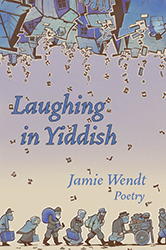In Fruit of the Earth, Jamie Wendt puts place and identity on opposite sides of a coin and then flips that coin over and over, trying to see both at the same time.
The book is split into five sections, with each section’s title referencing either an aspect of identity or a place. One of the first poems, “Tel Aviv Central Bus Station,” establishes many of the themes that appear throughout the book. In it, the speaker arrives at the bus station early enough “for the tea whistles, for flakey sesame croissants, / sweet bourekas, knafeh, nutty rugelach.” The people around her — both young female soldiers and scruffy American men — are evocative of the locale as well. While not geographically her home, the bus station is distinctly Jewish, like the speaker herself. And yet, once on the bus, she hopes the man beside her will begin talking to her; she longs for someone to ask about her own homeplace, so she can vocalize her identity in relation to it. At this point the poem turns, and the speaker begins to imagine a wandering life with this bus stranger, one where their shared identity and place is the other person — is “Walls, rocks, and worse, / the thousand reasons to leave.”
Towards the end of the book, the poems continue to explore that same idea of finding place and identity with a partner, though now from the perspective of a person fully established in a marriage. In “New Year 5774,” the speaker writes about spending the holiday with her husband in a new city where they do not yet have other guests to celebrate with. After she cooks the dinner and waits for her husband to arrive, the couple sits at the table to chant Hebrew and hold up their glasses. Wendt writes, “We are each other’s guests, / two seats taken while the suns sets / in our long high-rise windows facing west.” For this new wife celebrating an old holiday in a new city, there is still a longing for a place that feels emblematic of her identity. “We’re in Chicago, not Jerusalem,” she admits. Nevertheless, Wendt ends on an image that someone peeking through the window would have seen: a smiling couple with full glasses.
In Fruit of the Earth, Wendt constantly looks around to ask, Where am I? Who am I? How can I make these two things, together, matter? Through answering these questions, she creates a lush, rich world where one’s place and identity are allowed to shift and realign themselves while still remaining true and real.
Available for purchase here
Elizabeth Deanna Morris Lakes is a writer and editor. Her book, Ashley Sugarnotch & the Wolf, is forthcoming from Mason Jar Press.





